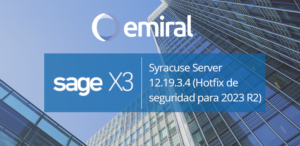Preventing companies, through dual-use accounting and management software, from manipulating or hiding accounting data, thus giving rise to tax fraud, is the main objective of the Tax Agency. To fight against this fraud there is Law 11/2021 on measures to prevent and fight against fraud. This Law is awaiting the approval of the draft of the Regulation so that it becomes mandatory, which is expected for January 2024. There is a lack of time for this, but the sooner this Law and its implications are known, the better, so that those companies that work with this type of software can be changed to those companies of #ERP such as sage that certify that their products meet legal requirements.
How to know if your software will be persecuted by the Administration
Although it is necessary to wait for the approval of the regulation to know the requirements that computer programs have to meet in order not to be detected by the Anti-Fraud Law, the truth is that this type of solution cannot facilitate the user to manipulate or hide data , as well as not keeping double accounting. with a parallel invoicing that is not declared.
Anti-fraud Law regarding computer programs
The Anti-Fraud Law establishes “the obligation on the part of producers, marketers and users, that the computer or electronic systems and programs that support the accounting, billing or management processes of those who carry out economic activities, guarantee the integrity, conservation, accessibility, legibility, traceability and inalterability of the records, without interpolations, omissions or alterations of which the proper annotation is not left in the systems themselves”.
Dual-use software is one that meets the following characteristics:
- Do not reflect (totally or partially) the entry of transactions made or reflect transactions other than the entries.
- Keep different accounts so that the Administration does not know the real situation of the company that pays taxes.
- Allow altering transactions that are already registered.
- Using a non-certified program.
- Failure to meet the technical specifications (they are pending definition).
Penalty for providers and users
When compliance with the technical requirements is mandatory, companies may not be excused under the umbrella of ignorance because the sanctions contemplated by the Law are aimed at both the providers and the users of said programs. The fines for providers amount to up to 150,000 euros and for users, 50,000 euros.
Other measures to avoid tax fraud
This Law also contemplates other measures:
- Limit of effective payments to 1,000 euros.
- Control of the cryptocurrency market.
- Extension of the concept of tax haven.
- Tax incentives are eliminated in some autonomous communities related to inheritances during life and succession agreements.
- Changes in registration tax.
- Prohibition of tax amnesties.
- Reduce the debt threshold to 600,000 euros to appear on the list of defaulters.
If you have questions about the software or are directly thinking of switching to a certified solution, please contact us.







